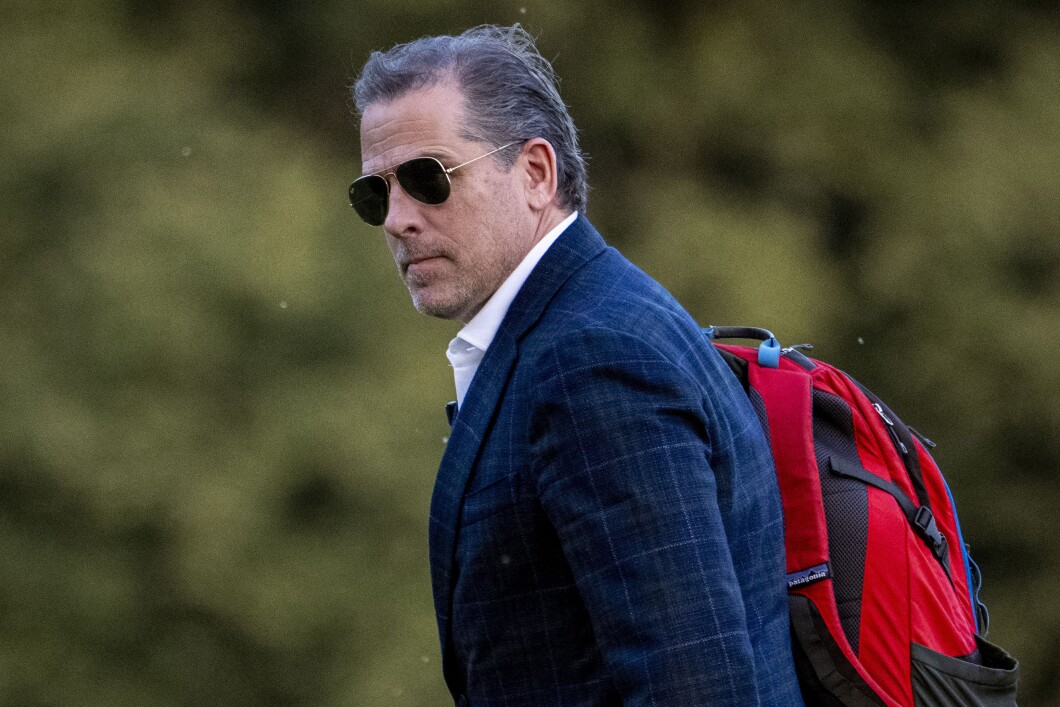
A key prosecutor who worked for years on the Department of Justice’s case against Hunter Biden refused to answer nearly every question lawmakers asked her during recent congressional testimony after the DOJ instructed her not to speak about the case, according to a transcript reviewed by the Washington Examiner.
Former Assistant U.S. Attorney Lesley Wolf, who appeared alongside her personal lawyers, told the House Judiciary Committee last week during a closed-door interview that she was “significantly constrained” by the DOJ in what she could discuss.
NEW YORK BILL WOULD REQUIRE SOME CHICK-FIL-A LOCATIONS TO REMAIN OPEN ON SUNDAYS
“My voluntary appearance here today is not without an overwhelming feeling of frustration and disappointment because as much as I would invite the opportunity to explain the decisions made and accurately describe the actions taken, I will not be permitted to answer most of the questions you have for me,” Wolf said at the start of the interview.
Wolf’s testimony came after two IRS whistleblowers who spent years working on the Hunter Biden investigation accused her of blocking investigative steps that they say were necessary to advance the case.
They blamed Wolf and others for allowing the first son to avoid certain tax charges and for allowing his father, President Joe Biden, to avoid scrutiny.
Republicans grilled Wolf during the interview about specific actions the whistleblowers said she took, but she responded repeatedly that she was “not able to discuss any particular matters related to an ongoing investigation.”

Days ahead of her testimony, the DOJ provided lengthy written instructions to Wolf, which the Washington Examiner verified, that said that even as a former employee, she is expected not to disclose nonpublic information about the investigation and prosecution of Hunter Biden. The department cited its internal policies and a statute that governs the disclosure of grand jury-related material as reasons for restricting her testimony.
The DOJ also sternly observed that Wolf was not the appropriate witness to answer questions related to the substance of the Hunter Biden case or DOJ personnel matters, repeatedly saying that senior officials, rather than line-level officials like Wolf, were better-suited witnesses to address those topics.
The DOJ also said it wanted to be cognizant of the separation of powers in prosecutions, a point that comes after Hunter Biden’s defense attorneys argued this month that his gun charges in Delaware should be dismissed on those very grounds. The first son’s lawyers claimed the DOJ breached the separation of powers by, in their view, caving to Republican lawmakers’ pressure to press charges against their client.
Wolf still provided some general comments that shed light on what she was thinking when she made the controversial decisions cited by the whistleblowers.
When Wolf was asked about an email she wrote to investigators instructing them to remove Joe Biden’s name from a search warrant, she said she could not discuss the matter. She did, however, speak to the process of drafting warrants.
“I think that’s important for people to understand that search warrants…are limited. They’re intrusions on people’s rights. And the default is an intrusion on someone’s rights. So that there are protections built into the process by the Constitution that the magistrates are responsible for enforcing,” Wolf said.
She said prosecutors must craft warrants and their attachments meticulously to ensure they are approved by a judge.
“If you’re presenting a warrant to a magistrate, you don’t want to overstate your case. You don’t want to be too broad, so you need to line things up,” Wolf said.
One of the IRS whistleblowers, Gary Shapley, told Congress that in 2021, he raised alarms internally that Wolf obstructed investigators from pursuing a potential campaign finance violation against Joe Biden.
Regarding that allegation, Wolf again would only speak generally about department policies, but she suggested that she was limited by the fact that Joe Biden was a political figure and that broadening the investigation would require more people to become involved with it.
“I previously mentioned the Feb. 5, 2020, Barr memo discussing the requirements and mechanisms for opening even a preliminary criminal investigation into a candidate or a public official, as well as the long-standing departmental requirements that all campaign finance investigations be routed in consultation with the Public Integrity Section, which then is also your obligations require sort of regular and consistent consultation with that section,” Wolf said.
Shapley had also said Wolf blocked investigators in 2020 from pursuing a warrant to search Joe Biden’s guest house in Delaware. He said it was “clear” investigators needed to search the home after uncovering evidence such as a WhatsApp message Hunter Biden wrote to a Chinese businessman in 2017 in which he said he was sitting there with his father and that his father was concerned about unfulfilled financial commitments.
“Lesley Wolf told us there was more than enough probable cause for the physical search warrant there, but the question was whether the juice was worth the squeeze,” Shapley said, adding that Wolf was concerned about “optics.”
Wolf said she could not talk about that particular incident but said she could speak generally on the topic.
“Sometimes the reason you shouldn’t do something is because of justice or fairness or there is some detriment, and sometimes the reason you don’t do something is because it’s going to be an incredibly heavy lift, and there are 87 other things that you want to tackle before you do that on any given day,” Wolf said.
Wolf provided little to no insight when asked about other key areas of interest in the Hunter Biden investigation, including an investigative form known as an FD-1023 from 2020 that accused Joe and Hunter Biden of accepting a bribe, a failed plea deal between Wolf’s office and Hunter Biden that a federal judge rejected, and her alleged lack of cooperation with former Pennsylvania U.S. Attorney Scott Brady, who was also at one point working on Hunter Biden-related matters.
Wolf resigned from the DOJ at the end of November after 16 years at the department.
She testified that her plans to exit “long predated and was unconnected to the baseless allegations” against her.
Her testimony comes as Republican lawmakers lead an impeachment inquiry into Joe Biden over allegations he used his political influence as leverage to help his family profit, and Hunter Biden’s foreign business deals are central to the inquiry.
The House Judiciary Committee has interviewed several DOJ officials to investigate, as part of the impeachment inquiry, whether the Biden administration attempted to obstruct the DOJ’s investigation into Hunter and Joe Biden.
Wolf, who has been a top target for Republicans, provided so little information that House Judiciary Committee Chairman Jim Jordan (R-OH) told reporters after her interview that the committee “may need to talk to her again.”
Jordan appeared frustrated by the interview, saying she “refused to answer … just about every question.”
The DOJ declined to comment on Wolf’s interview but pointed to comments that her former boss, special counsel David Weiss, made when he met with the committee last month about how prosecutorial decisions were never based on political bias.
CLICK HERE TO READ MORE FROM THE WASHINGTON EXAMINER
“Throughout this investigation, the career prosecutors on my team and I have made decisions based on the facts and the law,” Weiss said. “Political considerations played no part in our decision-making.”
Weiss, who has been leading the case against Hunter Biden since 2019, is obligated to complete a report detailing reasons for his decisions in the case once it has concluded. Attorney General Merrick Garland has said he will make the report public.



